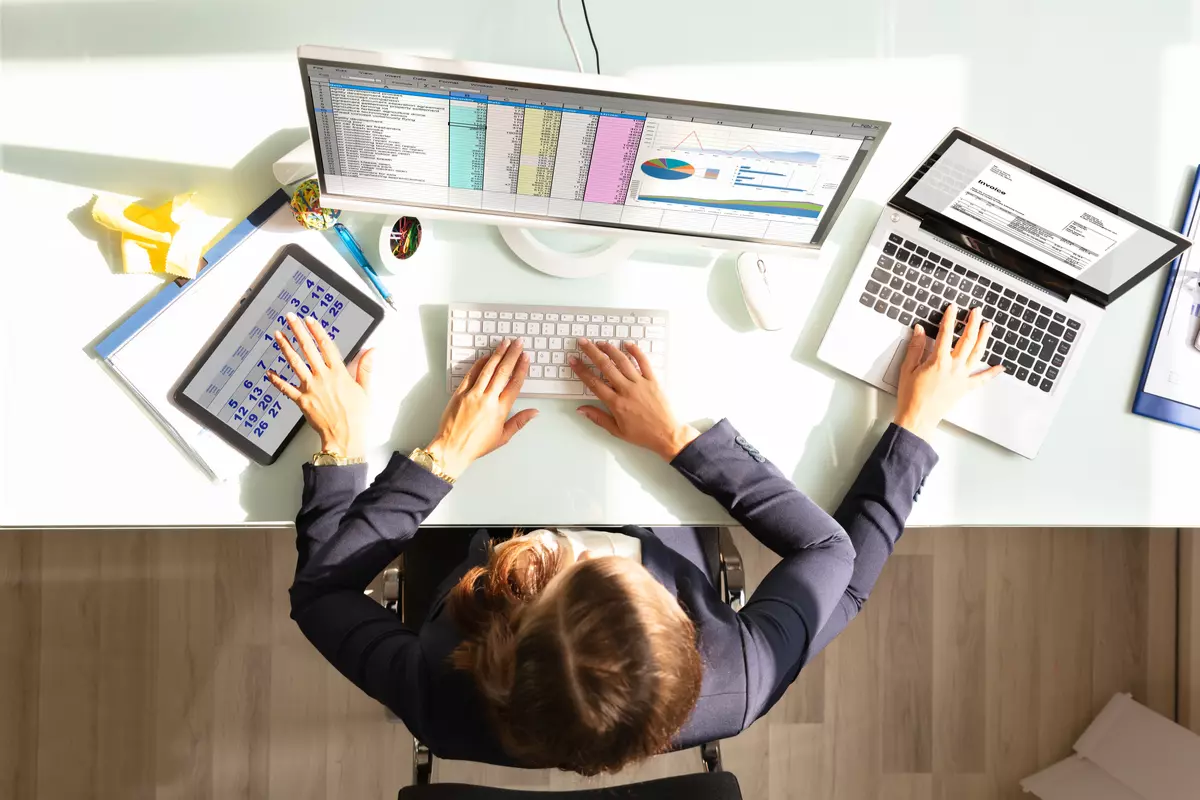How to Increase Your Efficiency of Work?
The topic of productivity and work efficiency is one that has been discussed and dissected across numerous self-help seminars and books time and time again. But can there really be a blueprint for increasing productivity and efficiency, or are some people just naturally better at getting more done?
Our 9 productivity tips below offer techniques to increase your efficiency of work as well as highlight ways to help your mind better focus. Applying these methods to your daily life can aid in your productivity and efficiency in the workplace long-term.
What Is Work Efficiency?
You can get more output from the same amount of input when you improve efficiency. As a result, employees can accomplish more in a limited time frame: the workday.
You can calculate work efficiency with this formula:
Output / Input = Efficiency
The output in the formula is the standard labor hours. The input is the actual number of hours you or your employees worked. Then multiply it by 100 to get a percentage. That’s your work efficiency.
Why Is Work Efficiency Important?
Increasing efficiency and productivity can be beneficial for many facets of your life. Some individuals may find themselves feeling like there are not enough hours in the day for everything that needs to get done. Knowing how to prioritize and organize tasks can be crucial to optimizing the time you have each day.

The desire to increase productivity can also come from the need to increase your financial bandwidth. If you are in a position in which you need to take on more work for monetary reasons, it may be necessary for you to figure out how to properly manage more tasks than you might have been accustomed to in the past and how to work more efficiently.
To this end, increased productivity can be essential to the process of starting a business or a “side hustle” alongside your current job. The prospect of having multiple jobs can be daunting and intimidating. Here’s how to increase your productivity and jump into your new ventures headfirst.
How to Work More Efficiently
Time management and organizational skills can commonly be correlated to overall work productivity. When you implement strategies that improve your efficiency, you may have a higher chance of developing and improving your product output.
Time management is just one of the strategies you can use to increase your productivity. Also, you can apply organizational strategies such as prioritizing your tasks by order of importance and urgency.
The following 9 tips offer ways you can increase your work productivity.
Accept That You Can’t Multitask and Be Productive All the Time
Multitasking can be difficult and can lead to decreased efficiency and productivity. For example, you might think, “it’s okay, I can do my work while I watch football,” or “I’ll just put the radio on,” but trying to perform such tasks in tandem can have a negative effect on how much you can actually get done.

Additionally, studies have suggested that our brains can go into overdrive when mixing multiple and potentially different undertakings at once. This can make getting tasks done more difficult. It can also reduce the quality of your work.
How to increase your efficiency at work?
Experts suggest making firm lists that outline the tasks you have to do and when. Finish one task before you even consider the next, and complete each one to the desired standard.
Create the Right Environment
Working in the most conducive environment can be key to limiting external distractions. Plus, as more companies move to remote, work-from-home models, you may find yourself having to work from a desk in a garage or spare room.

The right or most appropriate environment will vary slightly from one person to another. Some of us prefer to work from home, while others are better off working from office space.
Still, on a general level, it will help to work from a comfortable and quiet space with a good source of light and a stable internet connection (if this is essential to your work).
Additionally, it is important to reduce things that could get in the way of doing work. For example, it may not be optimal to put your desk in a room where kids are likely to come in and play or to have a television in your space that you might get tempted to switch on.
An appropriate workspace can greatly aid in increasing your efficiency of work and productivity by limiting distractions.
Work in 90 Minute “Bursts” for Improved Efficiency
Florida State University published a research paper that found that people working in intervals of 90 minutes are far more productive and efficient than those who try to push through their work for longer.

Both the brain and the body can become tired after working over a lengthy period of time. Working in short or sharp bursts, if you are able, can increase how much you can get done, overall and has positive impact on your efficiency of work.
Individuals may struggle to take a break as it may seem counterintuitive to step away from their work. But working in intervals can sharpen the brain. You can think of it in this way; it may be better to spend one hour working to your fullest capability than two hours working at 20% capacity.
Look After Your Body
Looking after your body can be an effective way to ensure you are at peak functionality, even if the work you are doing is not at all physical. Your brain’s ability to function at its best can often be tied to general bodily health.

To this end, maintaining a nutritious diet and getting plenty of sleep can help you better focus on your work and increase your efficiency of work. It can also be helpful to avoid consuming copious amounts of alcohol, as this can contribute to feelings of dreariness and exhaustion.
Give Yourself Deadlines
If you are self-employed or running a business, it is likely that you will not have supervisors or external deadlines to adhere to. If this is the case, it can be easy to put tasks on the back burner and neglect important responsibilities. This can also create unwanted stress and make it difficult to navigate daily schedules.

Having a self-imposed deadline and time to complete tasks can be helpful in such instances to increase your efficiency of work. A week-by-week calendar with tasks that you have to get done can help you become more organized and make sure that things don’t end up hanging over your head for months at a time. You can also consider utilizing project and task-management tools such as Notion, Asana, or Todoist.
Get the Blood Flowing
Studies have shown that increased heart rate and blood flow are linked to increased productivity. Sitting in an office chair all day can cause sluggishness and physical tiredness, which in turn can lessen the amount you are able to get done.

To improve work efficiency, you can do some simple exercises such as taking your dog for a brisk walk or performing star jumps at your desk. You can also buy a standing desk, which can be a good way to keep your body active while you work.
Turn Off Notifications (All of Them)
We live in the age of notification and from receiving news about your favorite sports teams to texts from your family, it can be easy to quickly get sapped away from what you are doing.

Turning off such notifications can positively increase your efficiency of work and productivity.
You can set breaks aside to revisit your notifications if necessary.
Do You Really Need to Do That?
In the world of business, there can often be a lot of “hot air” in the form of meetings and responsibilities that are not essential and that could be replaced with emails.

It is important to complete the necessary functions of your job and to perform duties to your highest of abilities. But if you have the chance to cut out certain nonessential meetings from your daily schedule or insist on shorter meeting times, you can potentially allow yourself more bandwidth to focus on tasks that really matter.
Studies and experts have pointed to the unimportance of some work functions. For example, Pareto’s “80/20” rule maintains that 20% of the work being done by individuals at their jobs can be considered as the real and essential core while the rest could potentially be cut out in some manner.
Remember Your Motivation
Centering your focus on the initial motivations behind completing necessary tasks can be a powerful psychological tool. Whether your tasks are socially or monetarily motivated, shifting your focus in this way can provide you with the will and determination to get more done.
Are your sales down? Learn how to motivate your sales team? Are you desperate to earn enough to go traveling? Put some pictures of your destinations up. Do you need more money for your family? Put pictures of your loved ones up.

While this technique should not be used as a way to guilt you into doing more, it can be easy to get caught up in the day-to-day and forget the bigger picture. A quick burst of enthusiasm and motivation can be all you need to get your next piece of work completed.
Bottom Line
There are many different ways to increase productivity. Plus, the type of work you do, in addition to your personality and interests, will play a part as well. But while there are no set rules that work for all individuals, implementing the above tips can potentially provide more structure and output in both your work and personal life.
Whether you are self-employed, work for someone else, manage a home, or all three, you can find effective productivity tools that can allow your brain the optimal chance of getting more done.
Table of Contents
- What Is Work Efficiency?
- Why Is Work Efficiency Important?
- How to Work More Efficiently
- Accept That You Can’t Multitask and Be Productive All the Time
- Create the Right Environment
- Work in 90 Minute “Bursts” for Improved Efficiency
- Look After Your Body
- Give Yourself Deadlines
- Get the Blood Flowing
- Turn Off Notifications (All of Them)
- Do You Really Need to Do That?
- Remember Your Motivation
- Bottom Line